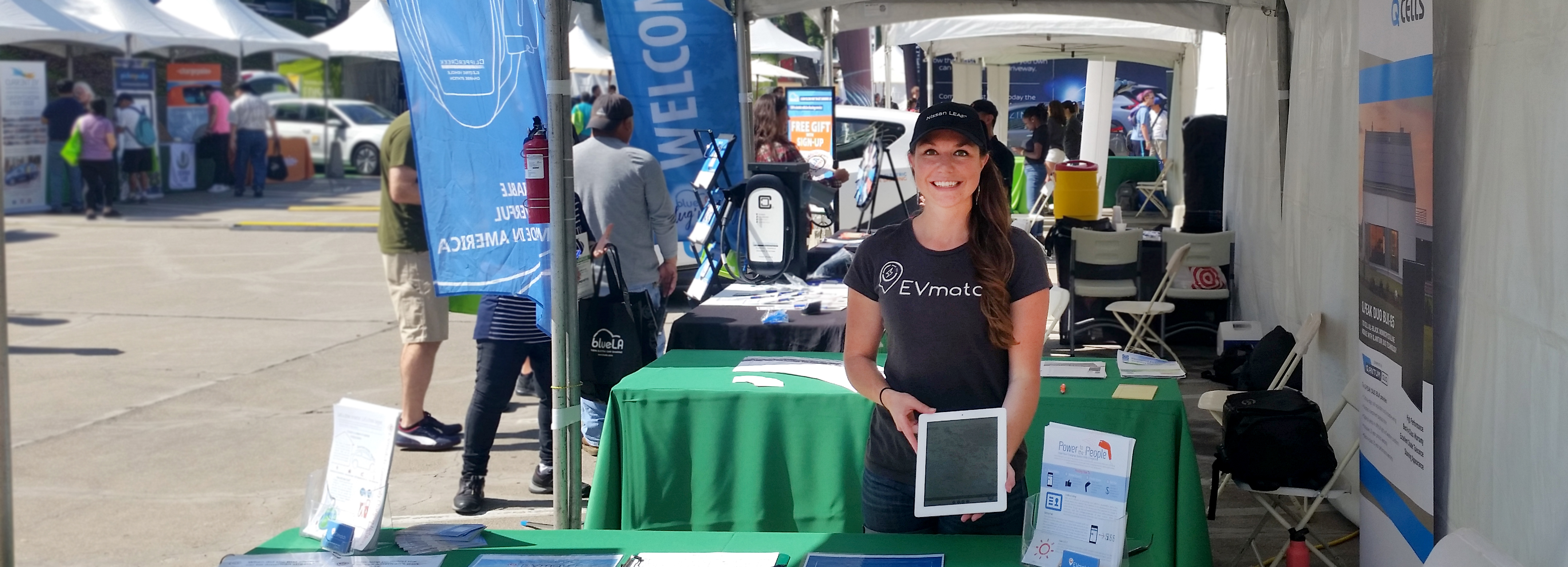Sometimes it takes a small spark of innovation to help a bigger idea catch fire. Heather Hochrein is betting her career on it. She’s a co-founder of EVmatch, a company that seeks to take the inconvenience and uncertainty out of driving an electric vehicle (EV) – and ultimately slow global warming. What started as a master’s thesis project at the Bren School has turned into a national, peer-to-peer app that makes it easy for EV drivers to find, reserve, and pay to use private charging stations.
“Entrepreneurs are all about challenging the status quo,” said Hochrein. “And that’s what we will need to stop climate change. It’s important that we have leaders who can build out companies, put systems in place, and change the rules that are holding back progress.”
Introduction to EVmatch: Transforming Electric Vehicle Charging
- Origin: Master’s thesis project at Bren School
- Mission: Alleviate inconveniences of EV driving
- Outcome: National app facilitating EV charging station access

Overcoming Entrepreneurial Challenges: From Good Idea to Sustainable Business
As master’s students within the Innovation Focus at the Bren School, Hochrein and EVmatch co-founder Shannon Walker were tasked with building a business model that solved an environmental problem. “After conducting a lot of research, we saw an opportunity to bring EV ownership to a broader group of individuals,” said Hochrein.
The program served as their idea incubator, allowing them the time, funding, and mentorship necessary to fully explore and validate their business model. Hochrein and Walker received crucial support from the Bren School’s Eco-E Endowed Graduate Fellowship Fund every step of the way.
Founded by Eco-E Advisory Council members Mary Moslander (BA ’88), Andrew Konigsberg, and Matt Riley (BS ’99, MESM ‘03) in 2017, the Eco-E Fellowship Fund has become an essential component of the program, helping students turn great ideas into viable entrepreneurial businesses.
In Eco-E projects, teams of 3-5 students collaborate over the course of a year to develop a business model intended to bring a new, commercially viable product or service to market and to make a positive and measurable environmental impact. Eco-E lecturer and program manager Emily Cotter is proud of the program’s accomplishments thus far:
“Out of the last 10 MESM classes, twelve out of 35 teams have launched ventures right out of the Eco-E program, and 58 percent of our co-founders are women,” she said. “We’ve designed a rigorous program that provides students with the tools and support they need to develop their ideas into successful ventures.”
While not all Eco-E projects launch as businesses, the students acquire skills that are invaluable across various environmental sectors. Students from the Innovation program have gone on to make change while working at public agencies, non-governmental organizations, and corporate sustainability offices.
“This program is successful because it encourages people to think through a range of solutions. It doesn’t have to be one-dimensional, like changing a law,” said Bren School dean Steve Gaines. “We teach students to go after big problems from multiple points of view.”
Going Beyond Incremental Changes: The Philosophy of Going Big
Andrew Konigsberg, Eco-E Advisory Council Chair and Eco-E Endowed Fellowship Fund co-founder, worked in energy and infrastructure for 40 years before becoming a donor and advisor.
“At this point in my life, I believe it’s either, go big or go home. Incremental measures aren’t going to cut it. Eco-E is an amazing program. It’s gratifying to invest in something with the potential to make an impact,” he said.
“The challenge for entrepreneurs is to build that initial product, get the financing, and then build out the team. The Venture Fellowship allowed us to get there faster,” said Hochrein. “We were able to develop our prototype, find users, and demonstrate the idea was viable.”
Once they had a minimum viable product (MVP), EVmatch qualified for a $50K grant from the State of California, which allowed them to invest in building out the software platform. Next, The Venture Internship Fellowship made it possible to offer an internship to Bren student Danny Ettelson.
“We were in a good position when we started pitching to angel investors in 2017. The Eco-E Fellowship funding created a nice domino effect,” said Hochrein.
Sustaining Growth and Riding the Momentum: EVmatch's Current Achievements and Future Prospects
Ettelson is now a full-time staff member at EVmatch. He feels fortunate to have landed his dream job right out of graduate school. “When I learned about EVmatch, I wanted to get involved. Electric vehicles are the most important tools for combating climate change. I can only see exponential growth,” he said. “But the infrastructure isn’t there yet. The Venture Internship funding gave me the opportunity to work for a company that started at Bren, with exactly the focus I wanted to have.”
Today, EVmatch serves about 5 thousand customers, with 600 charging stations in 30 states.
“The momentum is palpable in this industry,” said Hochrein. “Auto makers and states are starting to make commitments to phase out gasoline vehicles, and electric vehicles are becoming more affordable. When we started there was a lot of skepticism. But the Bren School believed in us from the very beginning.”
The Role of Bren School in Shaping Sustainable Futures
The success of EVmatch highlights the Bren School's crucial role in nurturing innovative solutions for environmental challenges. By fostering entrepreneurship and providing comprehensive support, the school is actively contributing to a more sustainable and environmentally conscious future.
